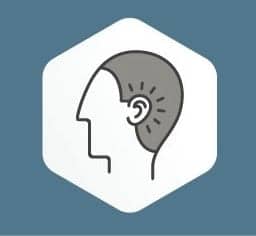HLAA 2023 Convention features experts in audiology, science, and music performance
The 29th annual HLAA 2023 Convention Research Symposium is set to take place on June 30. Titled, “Joy of Music/Loving Your Ears,” this year’s symposium will reportedly explore different aspects of music and hearing loss—featuring four speakers in the fields of audiology, science, and music performance: Marshall Chasin, AuD, Michael Santucci, AuD, Karen Chan Barrett, PhD, and Wendy Cheng. The panelists will present on topics including music enjoyment and the prevention of hearing loss, resources to protect hearing while making music, research on music perception, and the joy and challenges of being a musician with hearing loss.
Chan Barrett, an auditory cognitive neuroscientist, researcher at the University of California, and classical concert pianist, will present current research innovations on music perception in cochlear implant (CI) users.

“Currently, audiologists activate CI users with a generic pitch map, even though individuals vary,” explains Chan Barrett. “It’s like giving everyone a medium size t-shirt despite their different weights, heights, and needs. This one-size-fits-all approach can cause significant pitch distortion; one CI user may describe Madonna’s voice as sounding like Darth Vader, while another thinks it resembles Mickey Mouse. In the future, based on our research, CI users may be able to get individualized, tailored programming and processing strategies rather than maps based on averages.”
Founder of the nonprofit, Association for Adult Musicians with Hearing Loss (AAMHL), and HLAA member, Cheng will be presenting “Making Music with a Hearing Loss: Challenges and Progress over the Years” that is said to showcase AAMHL projects that have helped to advance knowledge to assist adult musicians at all skill levels.

“Twenty years ago, there was very little interest in the development of hearing devices that would be suitable for not only music appreciation but also performance. In the past, I struggled to have a fulfilling musical journey with significant, lifelong hearing loss. Today, I am fortunate to have an active musical life after receiving bilateral cochlear implants,” Cheng shared.
Cheng added that she wants HLAA members to know that it is possible to appreciate and make music with a hearing loss, and to encourage anyone who is interested to learn a musical instrument. “Let go of the mindset that you must have a ‘gift’ or ‘talent.’ Learning to play and read music is just like learning a foreign language—becoming fluent requires patience and taking time to practice newly acquired skills.”
Speaking on the factors that affect hearing loss for musicians, Chasin, the head of audiology for the Musicians’ Clinics of Canada, will present an overview of factors that affect hearing for musicians and the most effective hearing protection to minimize damage.

“Hearing loss prevention can be difficult, because damaging sounds are not necessarily that loud,” Chasin explained “Loudness … can vary from person to person and change depending on the situation. Humans are basically lousy at distinguishing potentially damaging sounds from others.”
Chasin will also be sharing in-depth about additional environmental strategies and other tricks for safely listening to music.
Santucci, an audiologist who has helped over 40,000 professional musicians, technicians, venue staff and music lovers in the past 35 years, and founder and president of Sensaphonics, Inc, will be speaking about the prevention of music induced hearing disorders and prevention strategies and technology used by professionals to maintain hearing with as little compromise acoustically as possible.

“Music professionals from almost all genres are exposed to high sound levels driven by the competing volume levels of others onstage who need to hear what they’re playing,” he explains. “But asking them to alter the sound, including loudness level, is challenging for most. It’s difficult for a musician to change their stage volumes because their auditory brain becomes used to a sound ‘signature’ that they have created by years of practice.”
The symposium will take place in New Orleans, June 30, from 8:30 to 10:30 a.m. in the Carondelet ballroom. Each panelist will speak for approximately 15 minutes, followed by an audience Q&A after the final presentation.
Admission to the Research Symposium is included with the full or daily Friday package and may be attended separately for only $20. Click here for Details & Registration.
To learn more about the presenters, view their full biographies and presentation abstracts on the HLAA Research Symposium web page.
Source: Hearing Loss Association of America
Images: Hearing Loss Association of America





